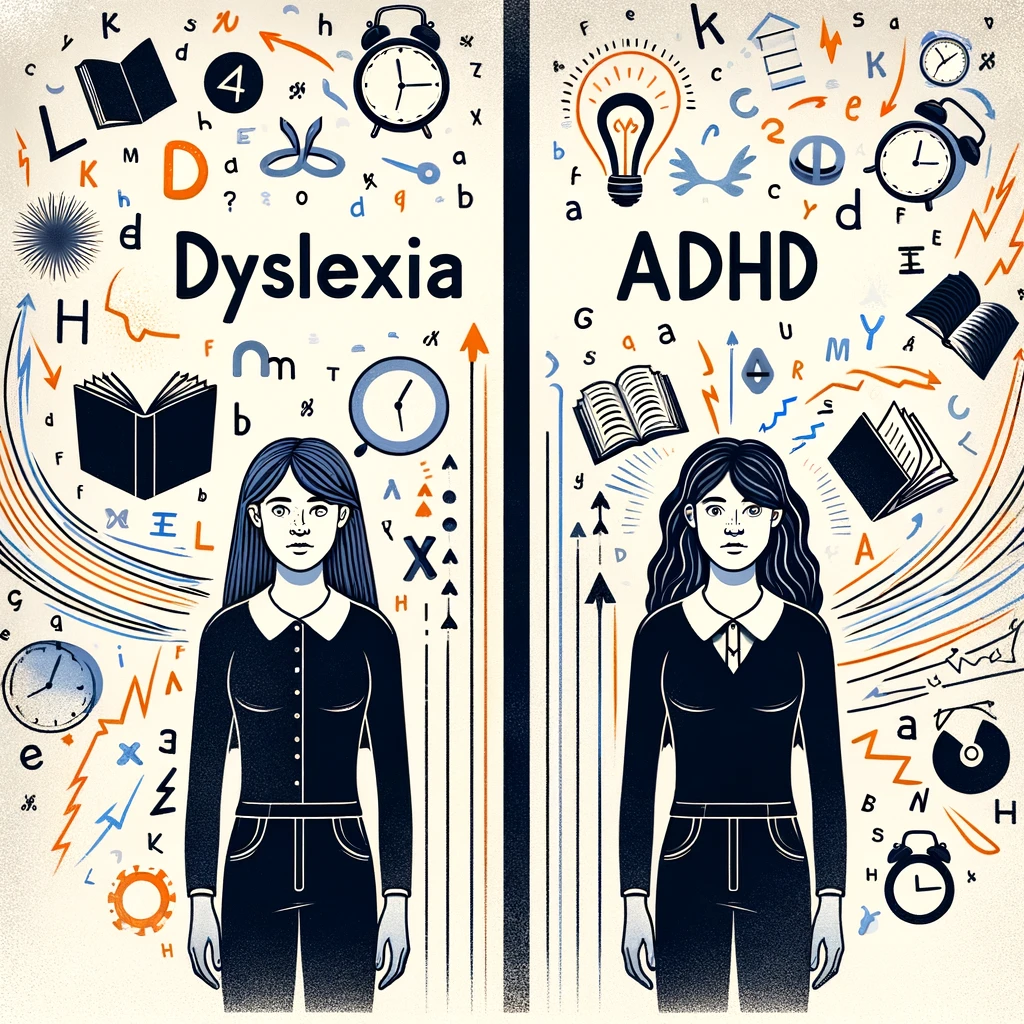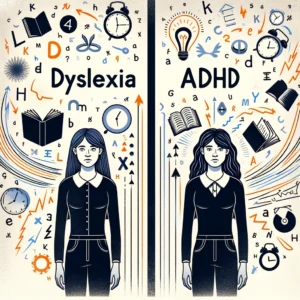
Understanding ADHD and Dyslexia in Women: A Guide
Table of Contents
ToggleUnderstanding ADHD and Dyslexia in Women: A Comprehensive Guide
 Navigating the complexities of ADHD and Dyslexia presents unique challenges, especially for women.
Navigating the complexities of ADHD and Dyslexia presents unique challenges, especially for women.
Overlap Between ADHD and Dyslexia
Common Comorbidity
A significant overlap exists between the two , with 30% to 40% of individuals with Dyslexia also experiencing ADHD. This suggests shared genetic and neurobiological pathways, emphasizing the interconnectedness of these conditions.Getting Diagnosed with Anxiety
Many women with Dyslexia and ADHD get diagnosed with anxiety disorders. It is not unusual to develop anxiety when you are not supported correctly in the world.Executive Functioning Challenges
Both ADHD and Dyslexia can impact executive functions, such as planning and attention maintenance, albeit for different reasons. This common ground highlights the need for targeted support strategies.Learning Hurdles
Challenges in academic settings, including difficulties with reading, writing, and attention maintenance, are common to both ADHD and Dyslexia, amplifying the need for comprehensive educational accommodations.What are some of the differences between the two?
Core Issues
ADHD primarily involves attention, hyperactivity, and impulsivity, while Dyslexia centers around challenges with reading and spelling, linked to phonological processing issues.Reading & Language
Dyslexia's impact on reading and writing is distinct from ADHD. Dyslexia entails specific difficulties with phonological processing, unlike the broad attentional challenges associated with ADHD.Attention & Hyperactivity
Key features of ADHD, such as sustained attention difficulties and hyperactivity, are not characteristic of Dyslexia, pointing to the conditions' distinct natures.Can you have both?
Yes. WHen you struggle with both it will can intensify learning challenges, potentially leading to underachievement. Tailored educational strategies and accommodations are essential for navigating these combined challenges, with a focus on leveraging individuals' unique strengths and resilience.Women & Dyslexia: Unique Struggles and Diagnoses
Women with ADHD and Dyslexia often face underdiagnosis and misdiagnosis, compounded by societal expectations and gender biases. These challenges necessitate increased awareness, advocacy, and a shift towards self-accommodation and compassion.Distinguishing ADHD from Dyslexia & Avoiding Misdiagnosis: What are the differences?
Differentiating ADHD from Dyslexia is critical for accurate diagnosis and support. This differentiation hinges on understanding the primary areas affected—attention and impulsivity for ADHD, and reading and phonological processing for Dyslexia. Comprehensive assessment and increased awareness are key to avoiding misdiagnosis and ensuring appropriate support.
Conclusion: Embracing Neurodiversity
ADHD and Dyslexia each present unique challenges and strengths. Embracing and supporting the neurodivergent community, particularly women who may experience compounded challenges, is crucial for fostering environments where everyone can thrive. Recognizing the importance of personalized education, advocacy, and the development of coping strategies is essential for supporting neurodivergent individuals.Additional Insights
Research into ADHD and Dyslexia sheds light on their genetic, neurological, and environmental factors. Understanding these aspects can enhance support and intervention strategies, emphasizing the importance of a nuanced approach that acknowledges both conditions' complexities.Supporting Neurodivergent Success
Success for individuals with ADHD, Dyslexia, or both involves a multifaceted approach that includes comprehensive evaluation, integrated support systems, and a focus on building on each individual's strengths and interests. In navigating ADHD and Dyslexia, especially as a woman, understanding, advocacy, and tailored strategies pave the way toward empowerment and resilience. This guide aims to offer insights and support to women navigating these conditions, highlighting pathways for growth and the celebration of neurodiversity.8 Facts
- High Comorbidity with Anxiety: Many women are often initially diagnosed with anxiety disorders due to the stress of coping with undiagnosed or unsupported neurodivergence.
- Unique Presentation in Women: These diagnoses can manifest differently in women compared to men, partly due to socialization and societal expectations. Women may develop more internalizing symptoms and use compensatory strategies to mask their difficulties.
- Late Diagnosis: Women with ADHD and Dyslexia tend to be diagnosed later in life. This delay can result from gender biases in recognition and referral for these conditions, with symptoms in girls often being overlooked or misattributed.
- Impact on Self-Esteem: The challenges and frequent underdiagnosis or misdiagnosis of neurodevelopmental issues in women can significantly impact self-esteem, leading to feelings of inadequacy and imposter syndrome.
- Increased Risk of Depression: There's a higher incidence of depression among women with these neurodevelopmental diagnoses, which can be exacerbated by the struggle with undiagnosed conditions and the effort to meet societal expectations.
- Social Anxiety: Women with ADHD and Dyslexia may experience higher levels of social anxiety, stemming from fears of social rejection or misunderstanding due to their neurodivergent traits.
- Strengths and Resilience: Despite these challenges, women often exhibit remarkable strengths, such as creativity, problem-solving skills, and the ability to think outside the box. Their journey through coping and adaptation can foster resilience.
- Neurodiversity Movement: There's growing recognition and advocacy for neurodiversity, emphasizing the value of diverse neurological conditions like ADHD and Dyslexia as differences rather than deficits. This movement promotes a more inclusive approach to education, workplace accommodation, and societal acceptance.



